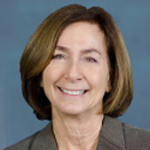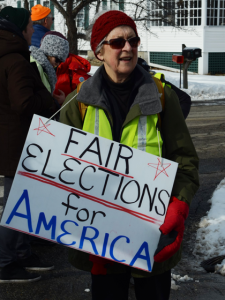BillMoyers.com is proud to collaborate with EveryVoice on a series of op-eds featuring ideas from a variety of viewpoints for making our democracy one that is truly of, by and for the people. Discover more ways to fight back against our broken campaign finance system. It’s a fight we can win.

Congress created the FEC in the wake of Watergate to ensure fairness in campaigns and full and fair participation in the political process. The agency was charged with enforcing campaign finance laws, including limits on and disclosure of campaign contributions. The creation of this small, independent and important agency to oversee and enforce election laws was meant to restore the public trust that was lost as a result of a campaign finance scandal that ended a presidency.

Protester at the New Hampshire Rebellion, an initiative that aims to raise awareness on the need for campaign finance reform. (Photo: Bettina Neuefeind/flickr CC 2.0)
But in recent memory, the FEC has been notoriously deadlocked and unable to perform its basic functions. The agency has struggled to make any decisions of consequence to the American public. It is a sad irony that the agency dedicated to increasing transparency in the political process is now cloistered and closed off from the public. The FEC exists in a walled-off echo chamber.
As the chair, I believe it is my duty to not only open the commission’s doors to the public but also to hear from citizens all across the country their views and concerns about campaign finance. I have commenced a listening tour across the country, visiting schools and community groups, as well as hearing from experts and academics, to learn what people have to say about money in politics. Inside the FEC, I have asked staff throughout the agency to consider whether what they do now to engage with the public has been effective, and to make recommendations about how to improve citizen engagement.
This month, history was made at the FEC by convening a truly public hearing and inviting everyone to come and speak. The hearing included renowned political lawyers, academics, and citizens representing only themselves, some of whom came from great distances, to share their views on the state of campaign finance in this country.
The importance of hearing from members of the public cannot be underestimated, even if their honest feedback may have rankled a few Washington insiders. There is much more than symbolism behind giving the public a forum to address a commission whose mission is so central to our democracy. A public report will be produced detailing all the witness testimony, and the over 32,000 comments which were received online in response to the meeting announcement and which are now on the FEC website. When addressing issues relating to campaign finance, this public record can be useful to the courts or Congress, and could be the basis for new legislation.
In addition, allowing the public to be directly involved in issues of consequence to our political process gives people greater confidence in government and the political system. Studies demonstrate that when people are informed about and involved in the decision-making process, they are more likely to trust the government.
When I came to Washington a little over a year ago, a DC campaign finance lawyer told me that the public doesn’t care about campaign finance issues. I won’t accept that. Having a truly open public meeting demonstrated that citizens do care about the way our elections are financed and the enormous impact that campaign finance has on our lives. I hope that this hearing is the first of many. We must involve and engage those whose participation and ideas are now shut out of the political process. If we don’t, the FEC will continue to fail to serve its purpose.


